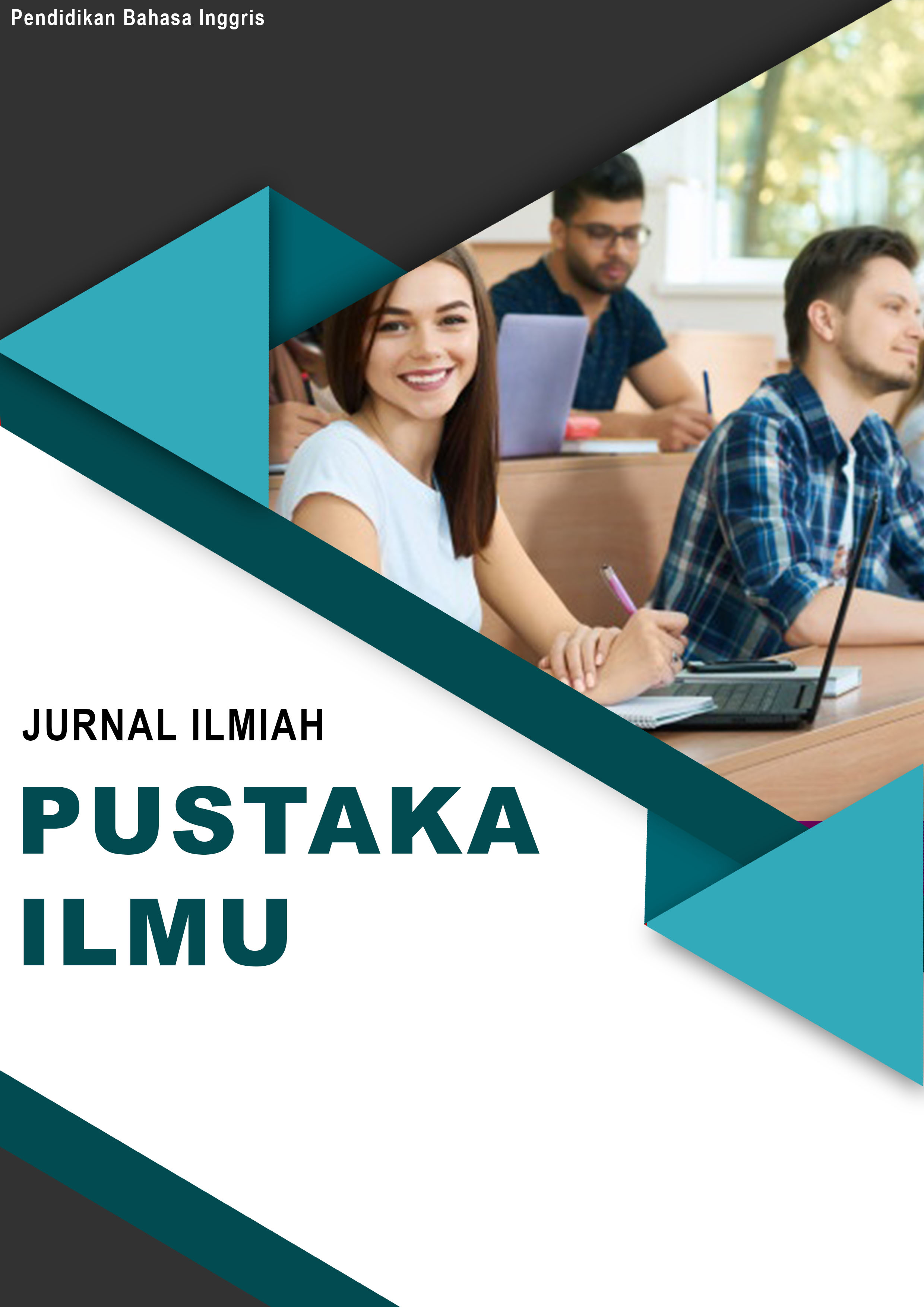IDENTITY CRISIS OF THE CHARACTERS SEEN IN ASWANY’S CHICAGO
Kata Kunci:
Identity Crisis, Social Relation, Social Policy, and Social Practice.Abstrak
In this research, the researchers explores about the identity crisis of the characters in the novel Chicago by Alaa Al Aswany. The aim of this research is to explain the identity of the characters that is in crisis as seen in Aswany’s Chicago. To accomplish this research, the researchers applies sociological approach. Then, to support the research, the researchers needs the concept of identity by Stuart Hall such as enlightenment subject and sociological subject to show the shifting process in five characters’ identity. Moreover, descriptive qualitative method is implemented in this research since the result of the analysis will be described by using the words not in numeral data. The data are taken from the narration and dialogue in Chicago novel. As the result of the research, the researchers presents the identity crisis of the characters as seen in Aswany’s Chicago novel. The identity crisis of five characters happen when there is a shifting process from the old identity to the new identity and it can be seen through the two concepts of identity. In the novel, the identity crisis of the characters can be seen when the characters think back about their identity that is supported by the uncertain feeling and it is also influenced by the society surrounds them or where they live.
Referensi
Amelia, D. (2021). Antigone’s Phallus Envy and Its Comparison to Indonesian Dramas’ Characters: A Freudian Perspective. Vivid: Journal of Language and Literature, 10(1), 23–30.
Amelia, D., & Dintasi, F. D. (2019). Ephebophilia suffered by the main character. Teknosastik, 15(2), 81–86.
Aminatun, D., Ayu, M., & Muliyah, P. (2021). ICT Implementation during Covid-19 Pandemic: How Teachers Deal with a New Style of Teaching. The 1st International Conference on Language Linguistic Literature and Education (ICLLLE).
Ayu, M. (2020). Evaluation Cultural Content on English Textbook Used by EFL Students in Indonesia. JET (Journal of English Teaching), 6(3), 183–192.
Berlinda, M. (2015). Teachers’ Beliefs On The Use Of Authentic Materialis To Teach Listening. UNS (Sebelas Maret University).
Gulö, I. (2014). Unique characteristics of Nias language. International Journal of English and Education, 3(3), 26–32.
Handayani, E. T., & Aminatun, D. (2020). STUDENTS’POINT OF VIEW ON THE USE OF WHATSAPP GROUP TO ELEVATE WRITING ABILITY. Journal of English Language Teaching and Learning, 1(2), 31–37.
Kardiansyah, M Yuseano. (n.d.). Metaphysic Paradox upon Daemon Character as Delineated in Philip Pullman’s Northern Lights.
Kardiansyah, M Yuseano, & Salam, A. (2020). The Translator’s Strategy as a Cultural Mediator in Translating Indonesian Novel into English. 4th International Conference on Language, Literature, Culture, and Education (ICOLLITE 2020), 413–418.
Kardiansyah, Muhammad Yuseano, & Qodriani, L. U. (2018). ENGLISH EXTRACURRICULAR AND ITS ROLE TO IMPROVE STUDENTS’ENGLISH SPEAKING ABILITY. RETORIKA: Jurnal Ilmu Bahasa, 4(1), 60–69.
Kuswanto, H., Pratama, W. B. H., & Ahmad, I. S. (2020). Survey data on students’ online shopping behaviour: A focus on selected university students in Indonesia. Data in Brief, 29, 105073.
Mandasari, B. (n.d.). FACTORS INFLUENCING TEACHERS’BELIEFS ON THE USE OF AUTHENTIC MATERIALS TO TEACH LISTENING.
Mandasari, B. (2016). An Analysis of Teachers’ Beliefs toward Authentic Materials in Teaching Listening. Teknosastik, 14(1), 19–25.
Mandasari, B. (2017a). Implementing Role Play in English for Business Class. Teknosastik, 15(2), 60–63.
Mandasari, B. (2017b). Role Playing Activity in English for Business Class for Non-English Study Program.
Mertania, Y., & Amelia, D. (2020). Black Skin White Mask: Hybrid Identity of the Main Character as Depicted in Tagore’s The Home and The World. Linguistics and Literature Journal, 1(1), 7–12.
Muliyah, P., & Aminatun, D. (2020). Teaching English for Specific Purposes in Vocational High School: Teachers’ Beliefs and Practices. Journal of English Teaching, 6(2), 122–133.
Muliyah, P., Rekha, A., & Aminatun, D. (2020). Learning from Mistakes: Students’ Perception towards Teacher’s Attitude in Writing Correction. Lexeme: Journal of Linguistics and Applied Linguistics, 2(1), 44–52.
Novita, D., & Husna, N. (2020). THE INFLUENCE FACTORS OF CONSUMER BEHAVIORAL INTENTION TOWARDS ONLINE FOOD DELIVERY SERVICES. TECHNOBIZ: International Journal of Business, 3(2), 40–42.
Novita, D., Husna, N., Azwari, A., Gunawan, A., Trianti, D., & Bella, C. (2020). Behavioral Intention Toward Online Food Delivery (OFD) Services (the study of consumer behavior during pandemic Covid-19). Jurnal Manajemen Dan Bisnis (Performa), 17(1), 52–59.
Oktaviani, L., & Mandasari, B. (2020). Powtoon: A digital medium to optimize students’ cultural presentation in ELT classroom. Teknosastik, 18(1), 33–41.
Puspaningtyas, N. D., & Ulfa, M. (2021). Students’ Attitudes towards the Use of Animated Video in Blended Learning. The 1st International Conference on Language Linguistic Literature and Education (ICLLLE).
Puspita, D., & Pranoto, B. E. (2021). The attitude of Japanese newspapers in narrating disaster events: Appraisal in critical discourse study. Studies in English Language and Education, 8(2), 796–817.
Pustika, R. (2021). Academic Whatsapp group: Exploring students’ experiences in writing class. Indonesian EFL Journal, 7(1), 89–96.
Rido, A., & Sari, F. M. (2018). Characteristics of classroom interaction of English language teachers in Indonesia and Malaysia. International Journal of Language Education, 2(1), 40–50.
Sari, F. M. (n.d.). UNDERGRADUATE STUDENTS’ATTITUDES TO THE IMPLEMENTATION OF WHATSAPP GROUP AS THEIR LEARNING MEDIA IN THE EFL CLASSROOM. Section Editors.
Sari, F. M. (2020). Exploring English Learners’ Engagement and Their Roles in the Online Language Course. Journal of English Language Teaching and Linguistics, 5(3), 349–361.
Sinaga, R. R. F., & Pustika, R. (2021). EXPLORING STUDENTS’ATTITUDE TOWARDS ENGLISH ONLINE LEARNING USING MOODLE DURING COVID-19 PANDEMIC AT SMK YADIKA BANDARLAMPUNG. Journal of English Language Teaching and Learning, 2(1), 8–15.
Wahyudin, A. Y., & Rido, A. (2020). Perceptuals learning styles preferences of international Master’s students in Malaysia. BAHTERA: Jurnal Pendidikan Bahasa Dan Sastra, 19(1), 169–183.
Yulianti, T., & Sulistiyawati, A. (2020). The Blended Learning for Student’s Character Building. International Conference on Progressive Education (ICOPE 2019), 56–60.
Yulianti, T., & Sulistyawati, A. (2021). Online Focus Group Discussion (OFGD) Model Design in Learning.


